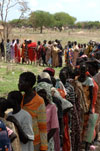
All eyes are on Sudan this week. On March 4th, the International Criminal Court’s Pre-Trial Chamber will announce its decision concerning the July 2008 request of ICC Chief Prosecutor Luis Moreno-Ocampo for an arrest warrant for Sudanese president Omer al-Bashir. While there are many speculations and recommendations circulating regarding potential next steps for the international community following the likely issuance of an arrest warrant for President Bashir, some strategies are better reasoned than others. It is certainly true that the situation in Sudan is complex and constantly changing and the country’s myriad problems require critical thinking. However, governments, analysts, and activists must be cautious when considering some arguments that fundamentally flawed. Some Sudan watchers assert that “only” nine hundred people died last year in Darfur, and thus the conflict has been “managed.” This is not only callous and insensitive to the victims and survivors of the conflict that has burned on in Darfur for the past six years, but it is also a poor analysis of the situation. In 2009, the Sudanese government launched two new aerial bombing campaigns in Darfur, causing the displacement of over 30,000 people. The government is also arming and training a group of Chadian rebels based in Darfur as they prepare to launch a coup attempt on Chad’s capital, N’Djamena. The situation in Darfur remains undoubtedly unstable, violent, and dangerous for Darfuris, including those living in camps for internally displaced persons.
Reprimanding the Chief Prosecutor of the ICC and characterizing his efforts to indict Sudanese President Omar al-Bashir as “more an indictment of the Court,” than of the president is shortsighted. There are claims that if March 4th brings “only” charges of crimes against humanity and war crimes would somehow dilute the value of a warrant, but we vehemently disagree. Even if the ICC’s pre-trial judges opt to dismiss the charges of genocide, Bashir will still be a war criminal with strong evidence against him. In the eyes of Darfuris and supporters of accountability and the end of impunity world wide, this is a major step forward.
Sudan is a country with a long history of conflict and internal strife rooted largely in the repressive government’s relationship with its embattled peripheral populations. These dynamics of conflict and repression will not be resolved easily, and the Sudanese people need every scintilla of support the international community can muster to help end their agony and give them hope for a peaceful, democratic Sudan. The ICC’s proceedings against President Bashir are crucial mechanisms that can contribute to the process of bringing justice to the long-suffering people of Darfur. Trivializing their pain or tolerating their butchers in the name of “stability” will neither bring them hope, nor will it lead to the resolution of—as compared to the mere management of—conflict not only in Darfur, but throughout Sudan.
Emily Roberts and Maggie Fick contributed to this post.

